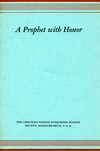

Are you sure?
This bookmark will be removed from all folders and any saved notes will be permanently removed.
Circulation Meeting on Behalf of the Periodicals, June 7, 1938
Address by Duncan Sinclair, Editor of the Journal, Sentinel, and Herald
It is a privilege to say a few words to this meeting as one who is intimately associated with the production of the periodicals, which Christian Scientists value so highly, and which they are doing their best wisely to place in the hands of Christian Scientists and non-Christian Scientists alike.
As I think of the periodicals my thought naturally turns to our Leader. Why should it do so? Because she was the Founder of every one of them. The periodicals were Mrs. Eddy's demonstration, her precious gift to our movement and to mankind. In thinking of her relation to them we cannot fail to appreciate what it must have cost her in prayerful effort to bring each of them into existence. And we can acknowledge now, knowing as we do what the periodicals have accomplished and are accomplishing, how far-sighted she was in establishing them. For they certainly are among the chief influences for good in the world today.
Enjoy 1 free Sentinel article or audio program each month, including content from 1898 to today.
JSH Collections
This article is included in:
1939 - PAMPHLET
A prophet with honor
JSH-Online has hundreds of pamphlets, anthologies, and special editions for you to discover.

July 16, 1938 issue
View Issue-
"I see Christ walk"
ETHEL MUNRO GOSS
-
Church
CHARLES ROLLAND SPENCER
-
"Thy will be done"
Josephine Demas
-
"Unspotted from the world"
MARIA TÖTTERMAN
-
"It never happened!"
JANE PLECHNER
-
A Happy Face
MARION SUSAN CAMPBELL
-
Love, Its Unfailing Appeal
ARTHUR J. TODD
-
Sanctuary
MARY C. REYNOLDS
-
The following statement is broadcast at the request of...
Albert E. Lombard, Committee on Publication for Southern California, in a statement broadcast over KGB,
-
Christian Science declares that sickness is the result of...
Miss Maude A. Law, former Committee on Publication for Barbados, British West Indies,
-
In your recent issue a correspondent, under the pseudonym...
Lieut.-Col. Robert E. Key, District Manager of Committees on Publication for Great Britain and Ireland, in the
-
In the Tromso Stiftstidende recently there was a book...
Nils A. T. Lerche, Committee on Publication for Norway, in the
-
Truths Which All Must Learn
Duncan Sinclair
-
The Mirror of Divine Science
George Shaw Cook
-
Letters from the Board of Directors
with contributions from The Christian Science Board of Directors
-
The Lectures
with contributions from Margaret Fell, Alfred W. Johnson, Elsie S. Reynolds
-
Words fail me in trying to write of my gratitude for the...
Elizabeth Schoreck with contributions from Marie Josephine Schoreck
-
The truth of Mrs. Eddy's statement in Science and Health...
William Groves Myers
-
In gratitude to Christian Science I earnestly desire to...
Louise Balazun
-
Christian Science is the greatest blessing that can come...
Florence E. Parker
-
I am grateful to God for the many blessings received...
Richard Knox Lee
-
Security
EDITH JOYCE ELDER
-
Signs of the Times
with contributions from Arthur A. Rand, E. S. Woods
-
Circulation Meeting on Behalf of the Periodicals, June 7, 1938
with contributions from Duncan Sinclair, Margaret Williamson, Samuel W. Greene
-
Monitor Advertising Information Committee Meeting, June 7, 1938
Address, in part, by Mrs. Florence B. Haeselich
-
Meeting in Connection with the Work of Librarians, June 7, 1938
Address, in part, by Mr. Harry I. Hunt


